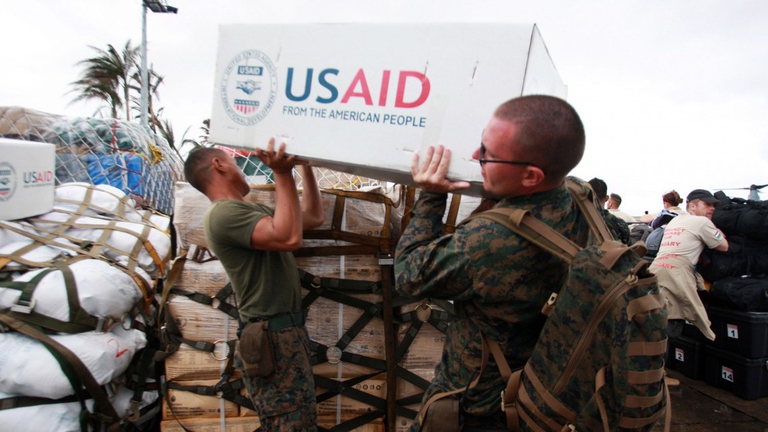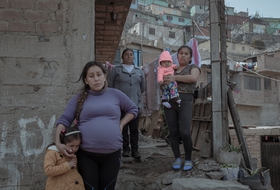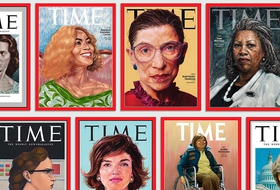
One in three women have suffered physical or sexual violence. With contributions from Europe, Africa, Asia and Latin America, we look at how this shadow pandemic affects every corner of the world.
53 promising ideas to defeat mortality were shared in the final stage of the this year’s Saving Lives at Birth Grand Challenge. All finalists met in Washington, DC between the 25th and 27th of July, learned from each other, interacted with potential collaborators, and participated in a number of discussion groups and one-on-one meetings. Engineers and entrepreneurs, scientists and students gathered for
53 promising ideas to defeat mortality were shared in the final stage of the this year’s Saving Lives at Birth Grand Challenge. All finalists met in Washington, DC between the 25th and 27th of July, learned from each other, interacted with potential collaborators, and participated in a number of discussion groups and one-on-one meetings. Engineers and entrepreneurs, scientists and students gathered for this event, their innovations focused on solutions to make the 48 hours after birth safer for children and mothers in the developing areas of the world.
.@USAID Acting Admin. Wade Warren will be giving the keynote speech at #DevX2017. pic.twitter.com/dqrKJe9B87— Saving Lives @ Birth (@GCDSavingLives) July 24, 2017
This partnership leverages the collective resources of the US Agency for International Development (USAID), the Government of Norway (Norad), the Bill & Melinda Gates Foundation, Grand Challenges Canada, and The World Bank Partners, expected to provide nearly 14 million dollars for the grant programme’s first round of funding. Over five years the partners aim to invest at least 50 million dollars in groundbreaking and sustainable projects in the areas of technology development, service delivery and demand creation with the potential of having a transformative effect on the lives of pregnant women and their babies in the hardest to reach corners of the world. Additional partners are also the UK’s Department of International Development (DFID) and the Korea International Cooperation Agency (KOICA).
Launched in 2011, Saving Lives at Birth is currently in its seventh year. To date the partners have funded 107 innovative tools and approaches aiming to address the 303,000 maternal deaths, 2.7 million neonatal deaths and 2.6 million stillbirths that occur around the world each year.
.@GCDSavingLives DevelopmentXChange happening today! Check out NEW stories about past & present innovators #DevX2017 https://t.co/a7iQZuusHL pic.twitter.com/RfpgeNtzUq
— USAID Global Health (@USAIDGH) July 27, 2017
This year’s competition received 750 submissions and 15 award nominees were selected. Nearly half of the submissions came from low- and middle-income countries. Ten projects among the 53 finalists were from the Global Health Technology Coalition (GHTC), which brings together over 25 nonprofits advancing health tools. From Neonatal Intuitive Feeding Technology for infants who have difficulties breastfeeding to Projecting Health India, a video education project, every corner of the world was involved in finding solutions which could soon be nominated for the transition-to-scale category which will be announced later this year.
Siamo anche su WhatsApp. Segui il canale ufficiale LifeGate per restare aggiornata, aggiornato sulle ultime notizie e sulle nostre attività.
![]()
Quest'opera è distribuita con Licenza Creative Commons Attribuzione - Non commerciale - Non opere derivate 4.0 Internazionale.
One in three women have suffered physical or sexual violence. With contributions from Europe, Africa, Asia and Latin America, we look at how this shadow pandemic affects every corner of the world.
The Istanbul Convention against gender-based and domestic violence marks its tenth anniversary. We look at what it is, who its signatories are, and what the future might hold.
European Commission President Ursula von der Leyen reminded us of the gravity of violence against women around the world, and of the Istanbul Convention’s utmost importance.
President Erdoğan has pulled Turkey out of the Istanbul Convention, key in the fight against gender violence, claiming that it favours the LGBT community rather than family values.
Violence against women in Peru has increased as a result of Covid-19 lockdowns. 14,912 people were reported missing from January to November 2020, more than half of them minors and 64 per cent women. People have been confined to their homes for months, many forced to endure poor physical, economic and social conditions. A situation that
Joys Estefani Qqueccaño Huamani, 24, disappeared from her rural community in Peru on 9 October. Her family began looking for her independently of the authorities and despite the resistance of relatives of Joys Estefani’s ex-partner Arturo Ccana Condori, 32, charged with committing violence against her on 28 September, eleven days before Joys Estefani disappeared. Photos
Costa Rica celebrated its first same-sex marriage when two women, Alexandra Quiros and Dunia Araya, celebrated their wedding: an “extraordinary moment”.
The pandemic and its restrictions are affecting everyone, without exceptions. However factors like housing, income inequalities, gender, access to technology and working conditions are influencing how people experience the health crisis.
Time magazine’s 100 Women of the Year project sheds light on influential women’s stories, from Amelia Earhart to Greta Thunberg. A selection of some of the greats for International Women’s Day.








